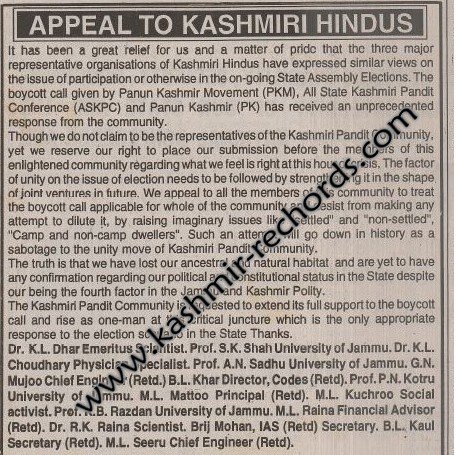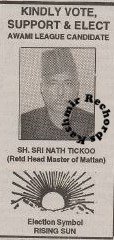(By: K R Ishan)
As Jammu and Kashmir prepares for its first Assembly elections since the abrogation of Article 370, the political landscape reflects a blend of renewed aspirations and deep-seated apprehension. For Kashmiri Pandits (KPs), this election is not just a test of democracy, but a referendum on their political future, mirroring the fraught environment of the 1996 elections held amidst militancy.

1996: A Moment of Political Defiance
The 1996 elections, held after years of insurgency, saw an unprecedented political vacuum in the Valley, where the specter of violence hung heavy. Political assassinations and militancy created a climate of fear, forcing parties to scramble for candidates. Despite this, several Kashmiri Pandits entered the electoral race, reflecting a community’s resolve to reassert itself in the Valley. Political outfits like the Bharatiya Janata Party (BJP) and Congress fielded Pandit candidates in sensitive constituencies like Habba Kadal, Amirakadal, and Hazratbal. In Habba Kadal, KP votes were anticipated to be pivotal, but it was National Conference’s P. L. Handoo who ultimately emerged victorious, relying on support from local Muslims.


Much like today, KP organizations called for an election boycott in 1996, citing marginalization, an echo that has returned in 2024. However, there were Organizations like Kashmiri Pandit Sabha, Amphalla, Jammu who encouraged KPs to actively take part in the polls.
2024: A Deja Vu of Dilemma
In 2024, Kashmiri Pandits once again find themselves at a crossroads. Fourteen KP candidates, including two from the BJP, have filed nominations, but many within the community remain disillusioned. Some KP organizations have renewed their boycott calls, accusing the political system of paying lip service to their plight while doing little to acknowledge the genocide-like conditions they endured during the exodus of the 1990s.
While a few candidates aim to bridge divides and secure a dignified return of KPs to their ancestral homeland, the boycott movement appears to be a strong, highlighting an entrenched belief that participation in elections could be interpreted as complicity in their ongoing marginalization.
The Genocide Recognition Demand: A Political Flashpoint
Central to the community’s discontent is the demand for official recognition of their exodus as genocide. Many KP organizations argue that meaningful political engagement cannot occur until this historical injustice is acknowledged. The Kashmiri Pandit Citizens’ Meet, held ahead of the 2024 polls, reiterated these concerns, calling the election process a “facade of normalcy” designed to ignore their grievances. For these leaders, the absence of genocide recognition is a non-negotiable point, and their boycott is a form of protest against a system they feel continues to marginalize them.
Habba Kadal: The Epicentre of KP Politics
Habba Kadal, a constituency with deep historical significance for Kashmiri Pandits, has once again become a key battleground. In 2024, six of the fourteen KP candidates are contesting from this seat, including BJP’s Ashok Kumar Bhat and Lok Jan Shakti Party’s Sanjay Saraf who advocates for the return of KPs with dignity, emphasizing their role as “ambassadors of peace.”


However, the divide within the community remains stark. While some are eager to return to the political arena, others are firm in their rejection, questioning the sincerity of parties that have yet to address their long-standing grievances.
Political Resurgence or Continued Marginalization?
As the elections approach, the question of KP political relevance is once again in the spotlight. In 1996, some felt the community was losing its political clout—a sentiment that has only intensified over the years. Local Muslims, now driving many of the political agendas, have largely filled the vacuum once occupied by KPs.
For Kashmiri Pandits, the 2024 elections represent both an opportunity and a risk. On one hand, it offers a chance to regain their political voice in a region that has increasingly side-lined them. On the other, participation in a process that ignores their core demands could deepen their sense of alienation.
As the election campaign unfolds, the Kashmiri Pandit community remains in a state of flux—caught between a desire to re-engage politically and the fear of further marginalization. The participation of KP candidates may offer a glimmer of hope for a community longing to reclaim its place in Kashmir’s political fabric, but whether this marks the beginning of a political resurgence or the continuation of their exclusion remains an open question.